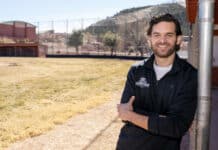Thanks to the generosity and hard work of residents and volunteers in Sedona, more than 100 feral cats at Windsong Trailer Park were trapped, neutered and relocated in the past year.
Larson Newspapers
Thanks to the generosity and hard work of residents and volunteers in Sedona, more than 100 feral cats at Windsong Trailer Park were trapped, neutered and relocated in the past year.
However, nearly every other local trailer park still needs similar attention.
On Tuesday, Jan. 13, Beatrice Welles’ second trap, neuter and return program for feral cats will begin in Sedona, and she is asking for monetary help from residents, visitors and shop owners.
She is also seeking people who are willing to provide foster homes for trailer park kittens that have not yet become antisocial.
Feral cats are not a glamorous cause, but communities with a heart and a sense of responsibility can eradicate these wild colonies by donating start-up funding and maintaining ongoing vigilance.
Ignoring the situation is the worst thing a community can do because cats are as prolific as rabbits when it comes to breeding.
One unspayed female, her mate and all of their offspring, producing two litters per year and counting less than three surviving kittens, on average, total 11,606,077 cats over the period of nine years.
Most of these felines do not live lives of luxury nor are they fed delicious tins of Fancy Feast.
According to Alley Cat Allies in Bethesda, Md., feral cats are opportunistic scavengers that typically survive on garbage while simultaneously existing in a state of terror and misery.
The trailer parks in Sedona offer not only ongoing sources of food from handouts and from dumpsters, but ready sources of shelter from the elements and relative safety from coyotes underneath the trailers.
Although the Windsong operation had to relocate the feline colonies because the trailer park is slated for demolition, most programs trap, neuter and return the cats so that they can defend their turf.
“Trap and remove attempts may temporarily reduce the number of feral cats in a given area, but two things happen,” ACA wrote. “One, unsterilized survivors continue to breed prolifically and two, other cats move into the now-available territory. This is known as the vacuum effect and has been documented worldwide.”
By returning the spayed and neutered cats to their original location, unspayed cats are prevented from moving in and the problem diminishes and eventually stops for lack of newcomers.
In other communities, including Flagstaff and Prescott, the Animal Defense League of Arizona has formal programs to eliminate feral colonies.
Sedona has no such program, prompting Welles, a fashion designer, to take on the problem herself, assisted by volunteers and others who care about the cats and the community.
“This is not what I want to be doing with my time,” Welles said. “But, if we don’t take care of it now, it will simply keep getting worse.”
Welles was one of five founders of the Animal Foundation in Las Vegas, Nevada, initiating that city’s low-cost spay and neuter program in 1988.
One of the people helping Welles here is Chris Bertch Mumaw, a veterinarian at Bell Rock Veterinary Clinic in the Village of Oak Creek, who provides low-cost spay and neutering for the ferals.
“First of all, feral cats carry disease, including rabies,” Mumaw said. “All of them are given rabies injections to decrease the transfer of this life-threatening disease and by spaying and neutering, we reduce the rate of breeding.”
Although some people advocate euthanizing the animals, it actually is more expensive than the proposed program.
Euthanasia costs approximately $240 per cat, accompanied by the threat of an endless parade of more and more fertile cats.
Trapping, neutering and returning, along with rabies shots, costs an average of $68 per cat due to the low cost services provided by Dr. Mumaw.
“Beatrice has been a very good client and friend for close to 15 years,” Mumaw said. “She takes excellent care of her animals, and if I can help her out, as well as the community at large, I’m happy to do so.”
Donations can be made by check to “W.T.P.C. Rescue” at the National Bank of Arizona at 1470 SR 89A in West Sedona or donors can go make a donation through PayPal at www.beatricewelles.com/rescue.htm.
Shop owners who are willing to put out donation tins to help collect spare change for the cause are much appreciated and can call 284-4219 to begin.
All those interested in helping in any way can call 284-4219 or e-mail wtpc@live.com.
Susan Johnson can be reached at 282-7795, ext. 129, or e-mail sjohnson@larsonnewspapers.com


















